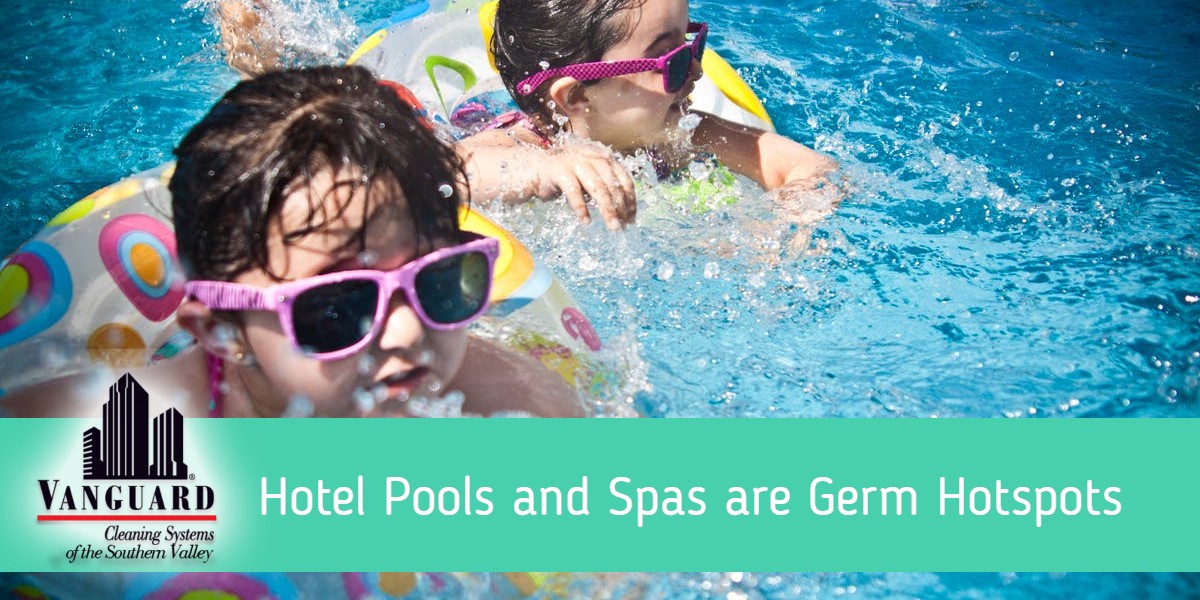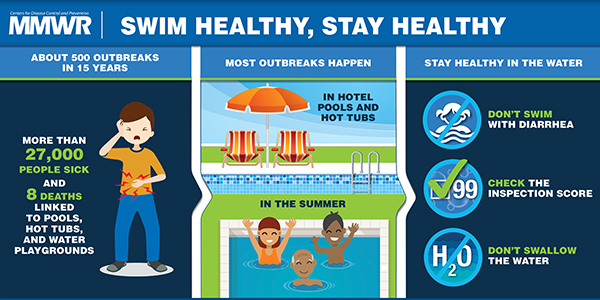High-quality hotel cleaning services will help eliminate the high percentage of recreational water illnesses associated with hotel pools and spas.

Hotel Cleaning Services for Pools and Spas
Relaxing in a hotel pool or spa after a long day is a hallmark of summer vacation activities.
Unfortunately, depending on the quality of care these facilities receive, swimming and relaxing may be hazardous to your health.
According to a recent article published by the U.S. Centers for Disease Control and Prevention (CDC);
During 2000–2014, public health officials from 46 states and Puerto Rico reported 493 outbreaks associated with treated recreational water. These outbreaks resulted in at least 27,219 cases and eight deaths.
Outbreaks Associated with Treated Recreational Water — United States, 2000–2014
The most common types of bacteria associated with these outbreaks are:
- Legionella - Causes of legionnaires disease, which can lead to flu-like symptoms and diarrhea, and;
- Pseudomonas - Causes folliculitis, more commonly referred to as 'hot tub rash', and otitis externa (swimmers ear).
Both bacteria are resistant to disinfectants.
Additionally, the Cryptosporidium parasite (passed through the human intestine) is a prolific issue, surfacing even in well-maintained pools--causing approximately 58% of all reported illnesses, which can lead to gastrointestinal issues and diarrhea.

Water Management Tips for Hotel Managers
While Legionella and Pseudomonas are susceptible to chlorine treatments, the cryptosporidium parasite is not.
To prevent outbreaks and the resulting illnesses associated with Legionella and Pseudomonas:
- Establish a water management plan that documents the entry and exit points of your facilities' water flow, as well as heating and cooling tanks and filtration systems.
- Develop a maintenance program that monitors the temperature of water heaters, water quality measurements, and disinfectant use, as well as routine cleaning schedules and procedures, including required chemical use.
- Document and implement a corrective action plan, such as emptying and cleaning tanks and fountains, when monitoring thresholds, such as the visible presence of slime, are exceeded.
- Develop and implement contingency plans in the event corrective action does not resolve the issue. Additionally, adjust monitoring and corrective actions that are necessary to adapt to ongoing maintenance requirements.
- Regularly report on findings and ongoing issues, as well as establishing a routine testing protocol for illness-causing bacteria.
For More Information:
Health Tips for Travelers
There are several tips that hotel guests can follow to avoid any potential health issues associated with pool or spa use, including:
- Know Your Risks - Individuals over the age of 65, smokers, and those with compromised immune systems are at an elevated risk.
- Don't Swim if You're Sick - The cryptosporidium parasite passes through human feces into the waterway, so avoid swimming if you have diarrhea.
- Check the Score - Always check the inspection score of the hotel spa and pool prior to entering to ascertain their health and safety performance record prior to unnecessarily exposing yourself to dangerous germs and parasites.
Cleaning Tips for Contaminated Pools and Spas
- Close the pool or spa to swimmers.
- Remove any physical matter that may be the source of contamination, such as stool.
- Drain the water as necessary, especially in spas/hot tubs.
- Scrub and rinse every surface that could have come into contact with the contaminated water.
- Replace or clean the filter.
- After refilling the pool or spa, add enough chlorine to achieve a pH of 7.2–7.8.
- Test for any contamination prior to allowing guests back into the swimming area.
Source:
References & Resources
Takeaway
Health and safety issues associated with public and hotel swimming pools and spas are more problematic, and closings occur more often than most people may realize.
According to a 2010 article published by the CDC;
About 1 out of 8 public pool inspections conducted in 13 states in 2008 resulted in pools being closed immediately due to serious code violations, according to a report released today by the Centers for Disease Control and Prevention.
The report found that, overall, inspections of child care facility pools had the highest percentage of immediate closures (17.2 percent), followed by inspections of hotel/motel pools (15.3 percent), and apartment/condo pools (12.4 percent). Inspections of kiddie/wading pools (13.5 percent) and interactive fountains (12.6 percent) had the highest percentage of disinfectant violations.
Improper disinfectant and pH levels in the water can result in transmission of germs, such as Shigella and norovirus, which cause gastroenteritis.
Monitoring and maintaining the equipment, as well as cleaning the facilities, can be an expensive and arduous task for hotel staff members, especially at smaller or privately owned establishments.
If you would like to learn more about the advantages of outsourcing general hotel cleaning services or specialty cleaning services for your hotel pool or spa–contact us today for a free quote!
In Bakersfield CA, call (661) 4373253
In Fresno CA, call (559) 206-1059
In Valencia CA, or Santa Clarita CA, call (661) 437-3253

